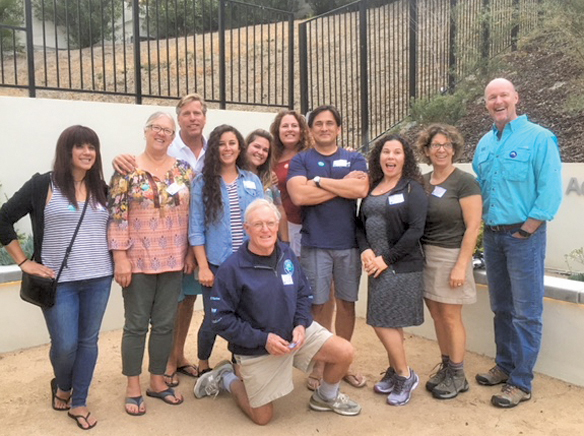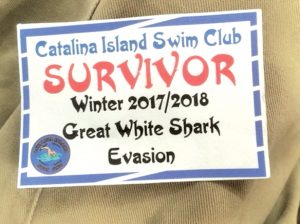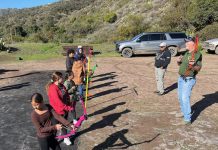

Quite appropriately, the Catalina Island Conservancy, in cooperation with the island’s museum invited Dr. Chris Lowe, Professor and Director of the California State University Long Beach “Shark Lab” to speak during the ongoing exhibit featuring “Jaws.”
Lowe spoke last Friday on the myths, misconceptions and realities of great white sharks in Southern California. According to the museum, it was a “jaw-dropping” discussion.
But for the Catalina Island Swim Club, it was a chance to promote themselves “with a little spoof” and some “jibberish,” according to swim club Coach Charles Canby.
“We decided to get together and have dinner before the speech,” said Canby and “have a little fun with it.”
He said the Catalina Island Swim Club meets every morning, 24/7/365 “rain or shine.” And they swim sometimes halfway to Hamilton Cove and back. “These are dedicated swimmers.”
Canby said before the speech, they made up awards for each of the members who had evaded a great white shark. The awards read “Catalina Island Swim Club “Survivor” 2017/2018 Great White Spark Evasion.”
In reality, however, Canby acknowledges the club swims in relatively shallow water and they are generally not at risk from great white sharks.
“Actually, we have never seen a dangerous shark,” said Canby, “we used Dr. Lowe’s talk as an opportunity for our informal and fun group to get together for a dinner.”
Further, he said “all (present) were honored with awards that they are wearing. Three swimmers are missing from the photo, not by swimming misfortunes but by prior commitments.”
Moreover, he said Dr. Lowe’s speech gave them insights and interesting facts about great white sharks.
Lowe presented an overview of efforts to track great white sharks and said most of the time, they strike in murky waters. The waters off Catalina are generally pristine and clear, though not always.
In addition, Canby said they learned that great white sharks will take an “exploratory” bite before attacking. Humans, he said, “do not have the fat content” preferred by the great whites so most often, the exploratory bite is the end of it as the shark will often “let loose” a human target.
The swim club often raises money for charities, he added, and they are putting together a fundraising swim to raise money for pancreatic cancer the weekend of the upcoming Catalina Art Festival.
The Pancreatic Swim will start at 7:15 a.m. on Saturday morning, Sept. 15, during of Art Festival Weekend.










